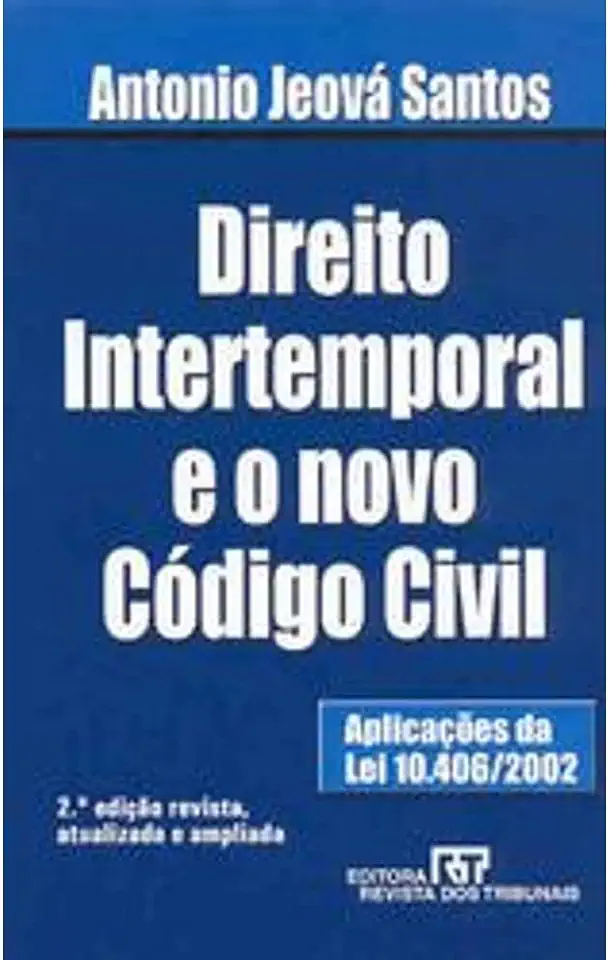
Intertemporal Law and the New Civil Code - Antonio Jeová Santos
Intertemporal Law and the New Civil Code: A Comprehensive Guide to the Legal Framework Governing Time in Brazilian Law
Introduction
In the ever-evolving landscape of legal systems, the concept of intertemporal law plays a pivotal role in ensuring the harmonious coexistence of laws enacted at different points in time. This book, authored by the esteemed legal scholar Antonio Jeová Santos, delves into the intricacies of intertemporal law within the context of the New Civil Code of Brazil, providing a comprehensive analysis of the legal framework governing time in Brazilian law.
Understanding Intertemporal Law
Intertemporal law, also known as temporal law or conflict of laws in time, addresses the complex challenges that arise when legal norms enacted at different times intersect. It provides a systematic approach to determining which law applies to specific legal situations, ensuring fairness and predictability in the application of justice.
The New Civil Code of Brazil
The New Civil Code of Brazil, enacted in 2002, represents a significant milestone in the country's legal history. This comprehensive code introduced numerous changes and innovations, including a dedicated section on intertemporal law. The book meticulously examines these provisions, offering a thorough understanding of the legal framework governing time in Brazilian law.
Key Features of the Book
Comprehensive Coverage: The book provides an exhaustive analysis of intertemporal law in Brazil, encompassing various legal areas such as contracts, torts, property, family law, and succession.
In-depth Analysis: Antonio Jeová Santos presents a profound analysis of the relevant legal doctrines, case law, and scholarly writings, offering a comprehensive understanding of the complexities of intertemporal law.
Practical Examples: To enhance the reader's comprehension, the book incorporates numerous practical examples and case studies, illustrating the application of intertemporal law in real-life scenarios.
Comparative Perspectives: The book draws insightful comparisons between Brazilian intertemporal law and the approaches adopted in other jurisdictions, providing a broader perspective on the subject matter.
Clear and Engaging Writing Style: Written in a lucid and engaging style, the book ensures that even complex legal concepts are presented in an accessible manner, making it suitable for both legal professionals and students.
Why You Should Read This Book
Stay Updated: Keep abreast of the latest developments in intertemporal law and the New Civil Code of Brazil, ensuring your legal knowledge remains current and relevant.
Enhance Your Legal Expertise: Gain a deeper understanding of the legal framework governing time in Brazilian law, empowering you to provide informed legal advice and representation to your clients.
Navigate Complex Legal Issues: Equip yourself with the tools to effectively navigate the complexities of intertemporal law, ensuring the successful resolution of legal disputes involving time-sensitive matters.
Expand Your Legal Horizons: Broaden your legal knowledge by exploring comparative perspectives on intertemporal law, gaining insights into different approaches adopted by other jurisdictions.
Invest in Your Legal Education: This book serves as an invaluable resource for legal professionals, students, and scholars seeking to deepen their understanding of intertemporal law and its practical applications.
Conclusion
"Intertemporal Law and the New Civil Code" by Antonio Jeová Santos is an indispensable resource for anyone seeking a comprehensive understanding of the legal framework governing time in Brazilian law. Its thorough analysis, practical examples, and comparative perspectives make it an essential addition to the libraries of legal professionals, students, and scholars alike. Invest in this book and elevate your legal expertise in the ever-changing landscape of intertemporal law.
Enjoyed the summary? Discover all the details and take your reading to the next level — [click here to view the book on Amazon!]